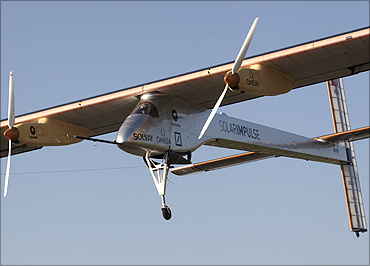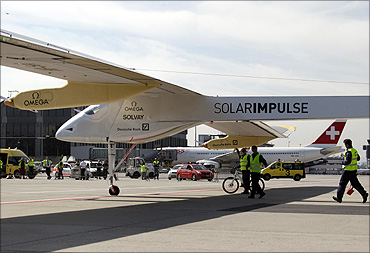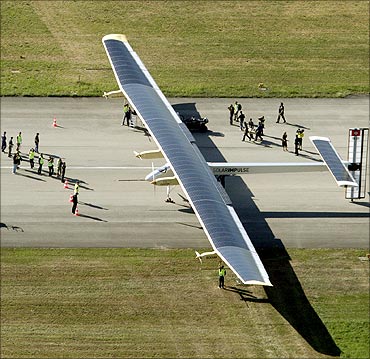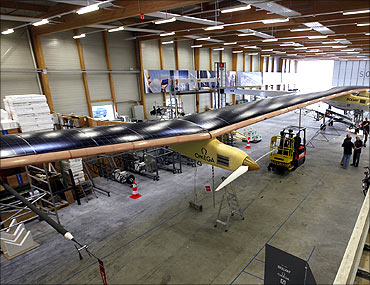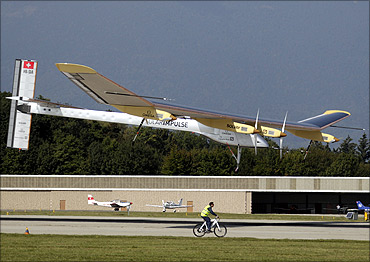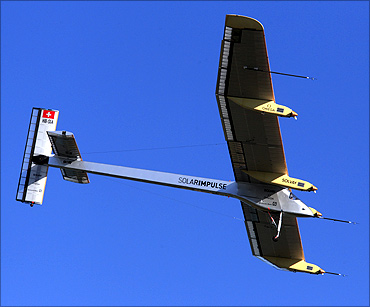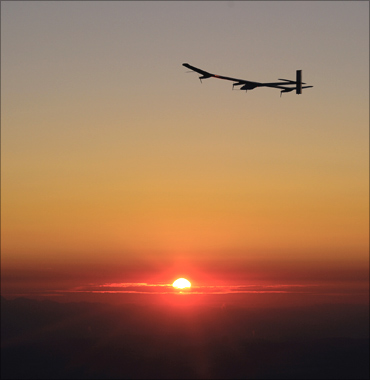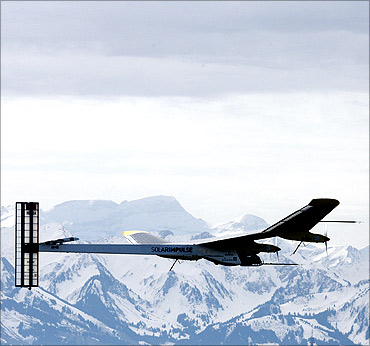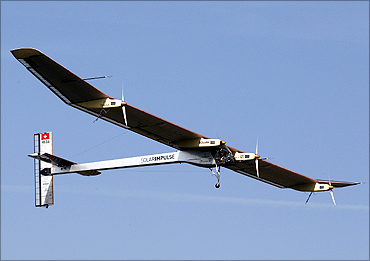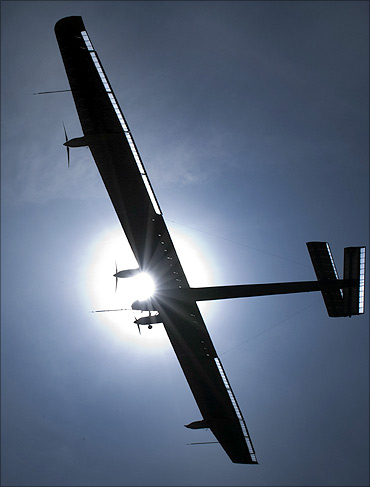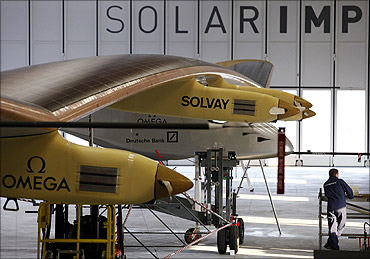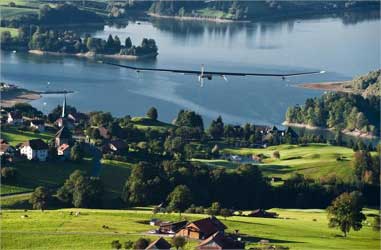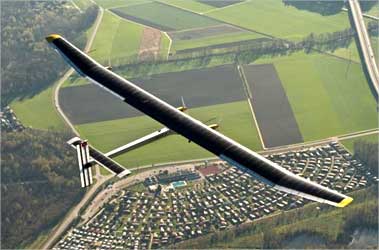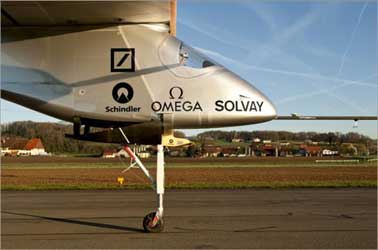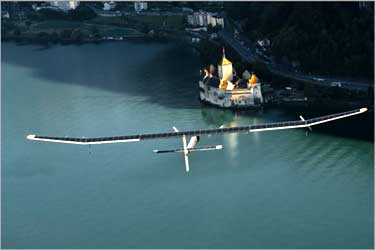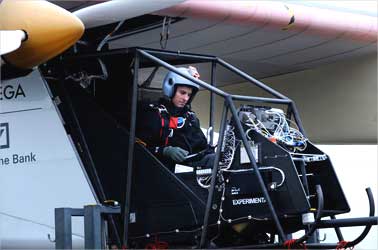 | « Back to article | Print this article |
This amazing plane flies ONLY on solar power
Solar Impulse is an European long-range solar-powered plane project being undertaken at the Ecole Polytechnique Federale de Lausanne.
The project eventually hopes to succeed in the first circling of the earth with a piloted fixed-wing aircraft using only solar power.
The project is promoted by Bertrand Piccard, who co-piloted the first balloon to circle the world non-stop.
Click on NEXT to read more...
This amazing plane flies ONLY on solar power
Solar Impulse's ambition is to contribute in the world of exploration and innovation to the cause of renewable energies.
It hopes to demonstrate the importance of the new technologies in sustainable development, and of course, once again, to place dream and emotion at the heart of scientific adventure.
Click on NEXT to read more...
This amazing plane flies ONLY on solar power
The first aircraft, bearing the Swiss aircraft registration code of HB-SIA, is a single-seater, capable of taking off under its own power, and intended to remain airborne up to 36 hours.
This aircraft first flew an entire diurnal solar cycle, including nearly 9 hours of night flying, in a 26-hour flight on July 7-8, 2010.
Click on NEXT to read more...
This amazing plane flies ONLY on solar power
The aircraft took off July 7 at 06:51 am and reached an altitude of 8,700 meters (28,543 feet) by the end of the day.
It then slowly descent to 1,500 meters (4,921 feet) and flew during the night on the batteries, charged during the day by 12,000 solar cells, which powered the four electric motors.
It landed July 8 at 09.00 am (GMT+2) for a flight time of 26 hours and nine minutes, setting the longest and highest flight ever made by a solar plane.
Click on NEXT to read more...
This amazing plane flies ONLY on solar power
The plane's first night flight attempt was postponed due to a defective telemetry transceiver.
The propeller plane, with a 61-metre (200-foot) wingspan, is powered by four electric motors and designed to fly day and night by saving surplus energy from its 12,000 solar cells in high-performance batteries.
Building on the experience of this prototype, a slightly larger follow-on design (HB-SIB) is planned to make circumnavigation of the globe in 20 25 days.
Click on NEXT to read more...
This amazing plane flies ONLY on solar power
Piccard initiated the Solar Impulse project in 2003. Since then, the team has grown to a multi-disciplinary team of 50 specialists from six countries, assisted by about 100 outside advisers.
The project is financed by private companies. The three main partners are Deutsche Bank, Omega SA and Solvay.
Other partners include Bayer MaterialScience, Altran and Swisscom. Supporters include Clarins, Semper, Toyota, BKW, STG. The EPFL, the European Space Agency (ESA) and Dassault provide additional technical expertise.
Click on NEXT to read more...
This amazing plane flies ONLY on solar power
Achieved timeline
2003: Feasibility study at the cole Polytechnique F d rale de Lausanne.
2004-2005: Development of the concept.
2006: Simulation of long-haul flights.
2006-09: Prototype.
2009: First flight of prototype
2009-10: Manned test flights with prototype
Click on NEXT to read more...
This amazing plane flies ONLY on solar power
Planned timeline
2011: Build HB-SIB
2011-12: Test flights
2012: Circumnavigation flight
Click on NEXT to read more...
This amazing plane flies ONLY on solar power
The plane has a similar wingspan to the Airbus A340.
Under the wing are four nacelles, each with a set of lithium polymer batteries, a 10 hp (7.5 kW) motor and a twin-bladed propeller.
To keep the wing as light as possible, a customised carbon fibre honeycomb sandwich structure is used.
Click on NEXT to read more...
This amazing plane flies ONLY on solar power
Maiden flight
On June 26, 2009, Solar Impulse was first presented to the public in Dubendorf, Switzerland.
Following taxi testing, a short-hop test flight was made on December 3, 2009.'
The pilot was Markus Scherdel.
Andre Borschberg, co-leader of the project team, said: "It was an unbelievable day. The airplane flew for about 350 metres (1,150 ft) and about 1 metre (3 ft 3 in) above the ground.
The aim was not to get high but to land on the same runway at a speed to test its controllability and get a first feeling of its flying characteristics."
He added that, "the craft behaved just as the engineers had hoped. It is the end of the engineering phase and the start of the flight testing phase."
Click on NEXT to read more...
This amazing plane flies ONLY on solar power
Further flights
On 7 April, 2010, the HB-SIA underwent an extended 87-minute test flight piloted by Markus Scherdel. In contrast to earlier tests, the April flight reached an altitude of 1,200 m (3,937 ft).
The aircraft first flew on purely solar power, charging its batteries in flight, on 28 May, 2010.
Click on NEXT to read more...
This amazing plane flies ONLY on solar power
General characteristics
Crew: 1
Payload: Lithium-ion batteries: 450 kg, (capacity: 200 Wh/kg = 90 kWh)
Length: 21.85 m (71.7 ft)
Wingspan: 63.4 m (208 ft)
Height: 6.40 m (21.0 ft)
Wing area: 11,628 photovoltaic cells: 200 m2 (2,200 sq ft)
Loaded weight: 1600 kg (3,500 lb)
Max takeoff weight: 2000 kg (4,400 lb)
Powerplant: 4 electric motors, 7.5 kW (10 HP) each
Take-off speed: 35 kilometres per hour (22 mph)
Click on NEXT to read more...
This amazing plane flies ONLY on solar power
Performance
Cruise speed: 70 kilometres per hour (43 mph)
Endurance: 36 hours (projected)
Service ceiling: 8,500 m (27,900 ft) with a maximum altitude of 12,000 metres (39,000 ft)
Click on NEXT to read more...
This amazing plane flies ONLY on solar power
The cockpit of the new Solar Impulse will include cabin pressurisation, supplemental oxygen and various environmental support to the pilot to allow a cruise altitude of 12,000 metres (39,000 ft).
The team hopes that a round-the-world flight will be possible in 2012.
The flight would circle the world in the northern hemisphere near the equator.
Five stops are planned to change pilots.
Each leg will last three to four days, limited by the physiology of the human pilot.
Click on NEXT to read more...
This amazing plane flies ONLY on solar power
HB-SIB is the Swiss registration code borne by the second Solar Impulse aeroplane.
The aircraft is planned for completion in 2011, with a pressurised cockpit and advanced avionics to allow for transcontinental and trans-oceanic flights.
The wingspan of HB-SIB will be 80.0 m (262.5 ft), slightly wider than the 79.75 m (261.6 ft) wingspan of an Airbus A380, the largest passenger airliner in the world.
Click on NEXT to read more...
This amazing plane flies ONLY on solar power
The major design constraint of the project is the capacity of the lithium polymer batteries.
Over 24 hours, in the best conditions, the power train will deliver an average of 8 hp (6 kW), roughly the power used by the Wright brothers' Flyer in 1903.
As well as charge stored in the batteries, the aircraft uses the potential energy of the height gained during the day for night flight.
